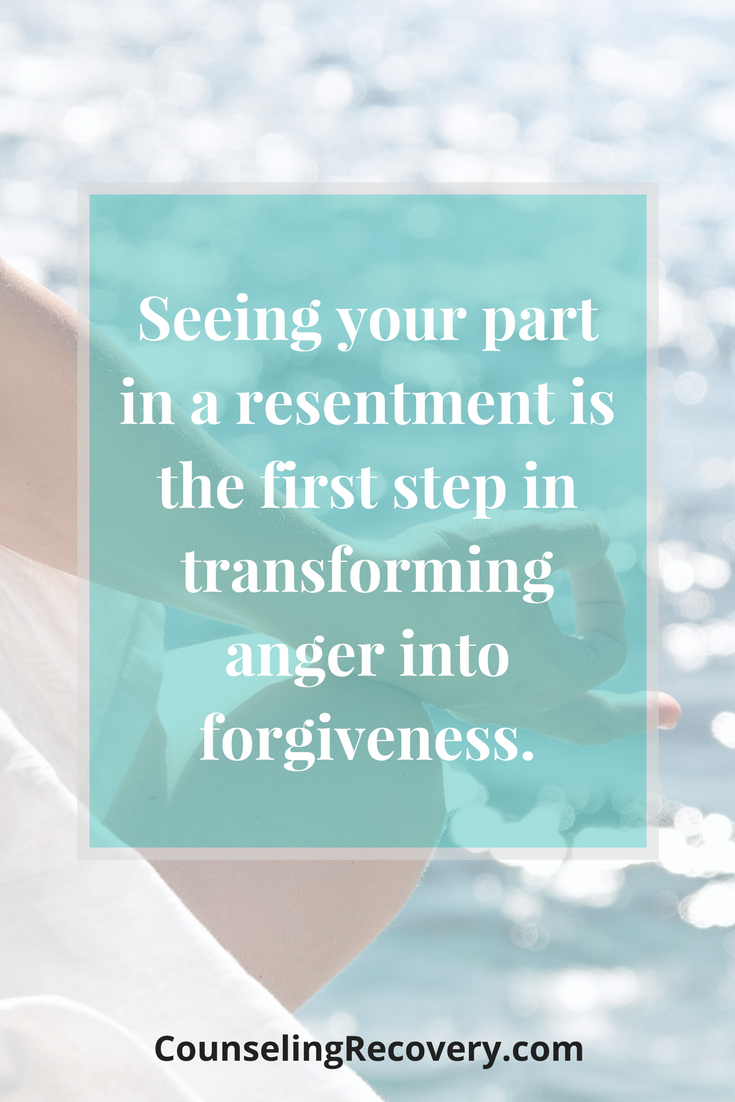Turning Resentments into Acceptance
Everyone has resentments. Unfortunately, letting go of them is where most people get stuck. You get to be right and tell a good story with you as the injured party. Over time though, that story prevents you from healing.
Holding onto a resentment is like taking poison and expecting the other person to die. This is a popular saying in 12 step programs. It sounds harsh but it’s true.
In this article, you'll find what it takes to heal a resentment, and why in some cases, you'd rather hold on to it.
What causes resentment?
Feeling wronged, betrayed or offended
Expecting someone to be different than who they are
Not admitting your true feelings
Hoping someone will give what you give
Wanting to avoid conflict
When you feel resentful, notice what happens in your body.
Is there a knot in your stomach or do your shoulders get tense? Unexpressed resentment gets stored in the body as stress. It feels like bricks on your back. After awhile you start feeling more and more unsatisfied in your relationships.
So why do people hold onto resentments? We hold because we think the anger is justified and that feels good. It's called secondary gain. That means there's a payoff for keeping the resentment going despite how it much hurts.
Finding out what that gain is will help you move past it.
Examples of Secondary Gains:
It gives you energy and a sense of purpose.
It gives you a compelling story.
Re-telling the story gives you attention and support.
It continues the cycle of being a victim so you don't have to do anything different.
By repeating the story, the resentment continues and nothing gets resolved. Initially you get some empathy but when resentments linger it changes your attitude. Have you noticed that ...
Resentments cause you to pull away and not trust people?
You start to assume others will hurt you?
You worry that if you let it go you will have to forgive?
Think why bother since you don't want to be vulnerable anyway?
You still think it’s all about the other person?
The Impact on Physical Health
Resentments can effect your physical health. A study by Carsten Wrosch, an associate professor at Concordia University, shows that people who struggle with resentment have higher blood pressure, increased heart rate and are at a higher risk for heart disease.
That's way too much stress on your body.
So if you're willing do something different...
How to turn resentments into acceptance
Writing to Heal
Here are the steps to heal a resentment.
Write down the resentment in detail. Tell the story without censoring yourself.
Second, consider how this resentment impacts you. Does it impact self-esteem, emotional or financial security, pride, relationships, or career?
Third, look at how your attitudes, words, gestures, even your silence sends a message. Find your part in the resentment.
Next, focus on what's unfinished. You may need to work on your own leftover hurt in some way. Saying what you need to say can bring closure.
Being Accountable for Behavior
An important step in decreasing resentments is taking a look at your own behavior. Owning what you said and did shifts the focus and increases empathy.
You realize that it's not all about what they did because you had a part in it too. When you're accountable the story changes and you can finally let go.
How to Communicate Resentment Effectively
Here's a simple format for communicating your resentment.
Name the behavior that's upsetting you.
Communicate your feelings and perspective (avoid trying to be right or arguing details).
Stick with one concern to avoid launching an attack.
Acknowledge your part to lessen defensiveness.
Be willing to hear their point of view.
When sharing your perspective this way, it comes across less defensively. It's a great way to be clear and communicate respectfully.
Using an "I statement" encourages the listener to respond rather than feel accused. An "I statement" simply states how you feel. It avoids blame which creates the chance of a better chance of being heard.
Example:
"I feel hurt when you don't answer my texts. I'd appreciate it if you could respond within an hour."
Practicing Acceptance
Resentments linger when you don’t deal with them. By healing resentments, you will get to a place of acceptance. You can be in the moment without necessarily agreeing with it. You can face the hurt instead of trying to suppress it. Even if the other person doesn’t change, by working through it yourself, you can find peace.
To read more click here The Secret to Practicing Acceptance.



